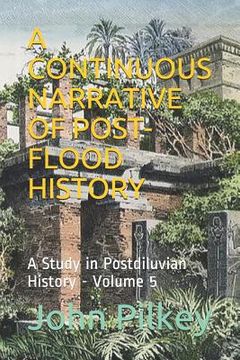A Continuous Narrative of Post-Flood History: A Study in Postdiluvian History (in English)
Synopsis "A Continuous Narrative of Post-Flood History: A Study in Postdiluvian History (in English)"
The historical record of humankind in the third millennium before Christ bears the stamp of Noah's family and of the events and structures outlined in Genesis 9-11. The purpose of monogenetic study is to consolidate the Biblical explanation of human origins by generating a historical science based on the family of Noah. The goal is to create a coherent Christian synthesis of the disjointed data of antiquarian study. This goal was pursued by a variety of authors between 1650 and 1820: Samuel Bochart, Paul Pezron, William Stukeley, Jacob Bryant, Sir William Jones, George Faber, and others. My logic resembles theirs. The difference between my work and theirs lies in the data furnished by archaeology since the discovery of the Sumerians around 1880. The challenge of my work is to combine their logic with the essential information unavailable to them.To trace the nations concretely from Noah is to consolidate the usage of John 3:16 and to picture humankind as former recipients of salvation fit for the evangelical mystery of regeneration. Without completing this task, we leave the "world" in the anonymous, profane condition In the final analysis, the Genesis-10 study is an attempt to advance the cause of holiness at the expense of profanity by countering the view that the world of humankind is the anonymous result of natural causes. The goal of monogenetic study is to consolidate, in scientific terms, the Biblical view that this world owes its existence to the sacred history of Noah. The study embodied in this postdiluvian timeline takes the Flood as seriously as it can be taken. Instead of reasoning about the Flood, it reasons from the Flood. That is what faith does. It "sanctifies" subjects by conferring on them the value of presuppositions rather than debate topics. I put the Flood to work by deducing the whole of ancient world history from it. Logically I cannot do otherwise. If the Flood happened and reduced the human race to four men and four women, it holds the key to every scrap of evidence deriving from human existence in the second half of the third millennium BCE. An accurate understanding of biblical monogenesis must be built, not on generalities, but on specific identifications of ancient names with a core of elite human beings listed in the text of Genesis 10-11. The Table of Nations in Genesis 10 refers to both races and men according to a pattern of interlocking feudal relationships. A systematic study of these lists by means of comparison with selected historical and mythological names results in certain surprises. At the time of the Flood, the four female survivors gained high importance as genetic carriers of the Adamic heritage of four races. thing- the lack of theologically explicit leadership.The eight persons who survived the Flood lived and breathed theocracy. Efforts to interpret these persons from a modern, democratic perspective have been ludicrous. In fact, the democratic mind despairs of ever understanding them and translates that despair into denial. Modern man doubts the Book of Genesis because he cannot cope with its political implications. The early postdiluvian lived in a context where gods, heroes, kings, and priests were given. "Kingship descended from heaven," reports the Sumerian King-List. Secularists have done their best to suppress this reality. They instinctively shun conflict based on the rivalry of theocratic power. Much of the narrative content of this study concerns such conflict. During the 350 years that remained to Noah after the Flood, his family created a political universe as evidenced by the systematic appearance of Sumerian city-states and the voluminous Sumerian King-List. We still live in the outer precincts of that universe.

